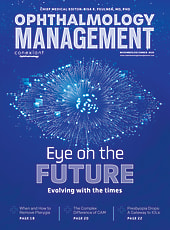Through the pandemic, it’s important to remember that just as we are impacted, so are our patients.
As I prepared to send my customer service column to Ophthalmic Professional editors, the recommendations suddenly seemed inappropriate for today. For many of us, daily life has been entirely disrupted by the COVID-19 pandemic. Numerous ophthalmology offices and ASCs are responding by caring solely for emergent patients, having employees working remotely, or closing their doors indefinitely.
I can only hope that by the time this article is published, the fears and safety measures from a world pandemic have subsided. However, as we may continue to make challenging decisions about our lives, our patients, and our business models, we must navigate the evolving crisis with thoughtfulness and grace. It’s important to remember that just as we are impacted, so are our patients; by extending grace and empathy, we can provide more powerful customer service when our patients need it most.
Grace in practice
Based on my research and experience, here are suggestions on how to extend grace during these stressful times.
Remain calm. Each day, we rise to face a new challenge and sort through myriad dilemmas to stay afloat. Indeed, business will look very different for many days to come; we, as the employees and managers of our practices, can offer calm in a variety of ways.
For example, if your practice is still able to field patient phone calls for ocular emergencies, staff members should be a reassuring voice on the other end of the line. Lend an empathetic ear to worried patients and calmly let them know the practice is there to support them and to help them find solutions.
Practice forgiveness. During an emergency, it’s human nature to focus on self-preservation; however, such times require us to look beyond ourselves. While it’s natural to worry about our income, bills, layoffs, and health, we must have empathy for others around us — who are likely experiencing the same troubles — and extend grace through forgiveness. If practice leaders have made the difficult decision to close the office(s), take solace knowing they wrestled with this decision. Likewise, if patients become angry with us or do not understand some of our safety protocols, forgive them for their stresses and fears.
Take responsibility. In the face of such adversity, many of us will make mistakes — it’s inevitable. Regardless, an essential aspect of customer service is the ability to admit when we are wrong and to apologize.
In some cases, we may need to apologize for circumstances that are not actually our fault, such as mandated office closures. Unfortunately, attempting to explain these situations to patients will likely come off as making excuses. Rather than justify the actions of yourself or colleagues, simply offer a sincere apology, reminding yourself that there is grace in humility.
Give thanks. In recent years, our practices have dealt with many challenges. Some of these challenges include increased patient wait times, angry patients, extra work caused by an ever-changing healthcare environment, and the responsibility of caring for others’ vision. However, some of these stresses seem much smaller when faced with the dilemma of not seeing our patients. As so many of us have time away from our practices, take it to give thanks. When you are finally able to return to the office, work to remain a positive blessing to co-workers, doctors, and patients.


Act with grace
When our offices re-open, we will face new challenges in practice operations. We will have many patients who need appointments, services, and surgery. On the phones and at check-in, we will need to take deep breaths and take one call at a time, one patient at a time. Our techs working up patients will need to explain why the office may be running behind schedule. When scheduling surgeries, our team will need to help work through the backlog of canceled procedures. In short, our customer service skills will be flexed and tested.
While it will not be easy to restart our practices, remember we can support our doctors and assist in the restoration of sight. Until then, my goal is to remain positive and be a blessing to my co-workers, doctors, and clients as we prioritize patient needs, protocols, and next steps. Such showings of compassion and generosity extend the best of ourselves to those around us and allow others to benefit from the kindness we cultivate. OP









